Big Sky, Big Election
Air Date: Week of October 20, 2006
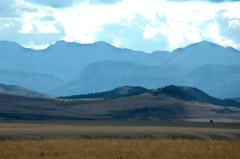
(Photo: Guy Hand Productions)
Montana Senator Conrad Burns should be enjoying the incumbent's advantage. Instead, he may lose his senate seat to Jon Tester, an organic farmer and state senator. Producer Guy Hand tells us the way Montanans relate to the land is reshaping the political landscape—and could determine the race.
Transcript
YOUNG: It’s Living on Earth. I’m Jeff Young. We’re following environmental issues in this year’s critical elections, and this week that takes us to Montana. Republican Senator Conrad Burns has represented Montana for eighteen years. Now polls show Burns could very well lose his seat to Democratic challenger Jon Tester, an organic farmer and president of the Montana state senate. Producer Guy Hand tells us the way Montanans relate to the land is re-shaping the political landscape in Big Sky Country.

Conrad Burns campaigning in Montana in May.(Courtesy of Burns Campaign)
HAND: U.S. Senator Conrad Burns has brought over two billion dollars in federal funds home to Montana during his three terms in office. He's helped fund scientific research, hi-tech jobs, and environmental restoration. He's also brought controversy: Disgraced lobbyist Jack Abramoff gave Burns more campaign contributions than he gave any other lawmaker in Congress. And the League of Conservation Voters has dubbed him one of their "Dirty Dozen" for a voting record they say favors the gas and oil industry.
A TV ad paid for by the Public Campaign Action Fund:
ADVERTISEMENT: (Oil CEO speaking) Things have been going great for us here at Big Oil.
[CHA CHING]
ADVERTISEMENT: (Oil CEO speaking) I love that sound! And I love your senator Conrad Burns, too! 'Cause Conrad voted for our energy bill, three point eight billion dollars in tax breaks and subsidies for us. We like having a senator we can count on.
HAND: Burns defends his vote on the energy bill saying energy independence is vital for national security. That's why he's in favor of alternative fuels and drilling in the Arctic
National Wildlife Refuge. Still, he's seven points behind in the polls.
[WALKING SOUNDS]
HAND: So, where are we?
OCHENSKI: We're on what used to be the main entrance to the capital.
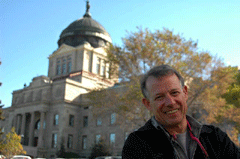
Political writer George Ochenski at the Montana state capital in Helena. (Photo:Guy Hand Productions)
OCHENSKI: …and looks out across at the Helena Valley towards the Sleeping Giant that you can see on the horizon…
HAND: Political writer, George Ochenski, points to open country that, on this clear October day, seems only an arm’s length away. Even here at the capital, we're dwarfed by the landscape that surrounds us.
OCHENSKI: This is the path of the Missouri. From here, the Missouri goes down stream, and….
HAND: Montana is a large state with a small population. There are no big cities and many of its citizens live well outside even its smallest towns. Nature is in your face. But Big Sky Country, with its wealth of resources, attracts big industry. And the effects of those industries are stamped into both hard rock and memory.
Dave Peterson remembers, as a child, the first time he laid eyes on the Anaconda Mining Company’s Berkeley Pit, a vast open copper mine in Butte.
PETERSON: The pit was enormous and barren.
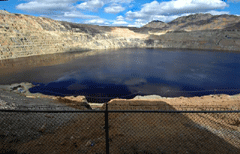
The Berkeley Pit in Butte, Montana. One of the largest Superfund sites in America, it is slowly filling with highly acidic, heavy metal laden water.(Photo: Guy Hand Productions)
PETERSON: As I grew older, the pit grew larger. And each year, or however often we drove across there and looked at it, the scar grew worse.
HAND: One of the most massive Superfund sites in America, the Berkeley Pit is a mile wide and deep enough to hide the Empire State building. It reminds Montanans of the influence Anaconda and other companies once had over the state. Again, George Ochenski.
OCHENSKI: It was referred to as Montana wearing the Copper Collar. The copper kings ran this state. They owned the newspapers, they bought the legislature, they threw bags of money through the transoms of the legislators’ rooms at night, and the people of Montana basically revolted against that in 1972.
HAND: When they re-wrote their constitution, in part. to clearly spell out the right to a clean and healthful environment, in the '70s, Montanans also passed some of the strongest state environmental laws in the nation. As the economy soured in the '80s and '90s, they rolled back many of those laws. But Theresa Keavany, director of the Montana League of Conservation Voters, says after two decades of placing jobs above other concerns, Montanans are again emphasizing the environment.
KEAVANY: In 1998, voters passed a measure to ban new cyanide leach mines. In 2000, they passed a measure to ban canned hunts and game farms. And then, in 2004, despite incredible odds, four million dollars spent to try to repeal the ban on new cyanide leach mines, voters said "no way, no how," and 58 percent said "we want that ban."
HAND: In 2004, Democratic Governor Brian Schweitzer replaced the unpopular, pro-industry Republican Judy Martz. And now, voters may soon remove their seasoned U.S. senator.
[Sound of phone bank]
HAND: Volunteers for the Montana League of Conservation Voters have gathered on this rainy Saturday morning in Billings to call voters, probe their opinions on environmental issues, and encourage them to vote for candidates like Jon Tester, Conrad Burns’s Democratic challenger. Theresa Keavany:
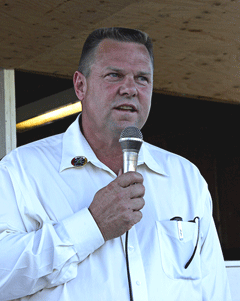
Jon Tester campaigning in June. (Courtesy of Tester Campaign)
HAND: As a state senator, Tester pushed a bill that mandates Montana move toward renewable and alternative energy sources. If elected to the U.S. Senate, he promises to create a National Renewable Energy Standard, providing incentives for wind, bio-fuels, and alternative energy. Tester scores high in the League's political rating system.
KEAVANY: His lifetime average with Montana conservation voters is 75 percent, compared to Conrad Burns’s lifetime average with the League of Conservation Voters of four percent.
HAND: Senator Burns says Tester's environmental stance is too extreme for Montana. One of his ads makes that clear.
ADVERTISEMENT: Tester is backed by radicals that want to stop logging and tear down dams. And Tester votes 92 percent with radicals who would cripple energy production in Montana. That’s who supports Jon Tester.
HAND: Yet, the most enthusiastic audience response at one recent debate in Bozeman seems to come with a question about global warming.
ANNOUNCER: Senator Burns. Global climate change.
BURNS: We've been warming since the Ice Age (groans from audience). Since the Ice Age we've been warming. And that continues. That's a pretty well known fact.
ANNOUNCER: Jon Tester.
TESTER: Earth has warmed since the Ice Age, that’s correct, but it's warming much more rapidly now than it ever has in our history.
[BIG APPLAUSE]
HAND: But Senator Burns does find support among some conservation voters.
RAPPOLD: And you've got Walling Reef right there and then you've got Old Man of the Hills right next to it.
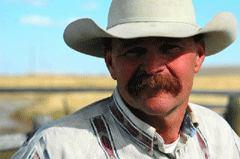
Karl Rappold lives on the ranch on the Rocky Mountain Front his grandfather built in 1882. He is for stopping gas and oil leasing in the area, and is a vocal supporter of Conrad Burns. (Photo: Guy Hand Productions)
HAND: Rancher Karl Rappold lives along the Rocky Mountain Front. It's a stunningly beautiful place where, as he puts it, the prairie crashes right into the mountains.
RAPPOLD: I mean this is the only place left where every species of wildlife is still here that was here when Lewis and Clark came through. That says something, in itself right there.
HAND: Rappold, his well-worn cowboy hat shading a walrus mustache, points to the massive rock walls erupting along the western edge of his land. He's a life-long Republican who's been fighting against gas and oil development on the Front for decades. And that's exactly why he is voting for Conrad Burns.
RAPPOLD: Senator Burns has been very helpful to what we've been trying to do up here on the Rocky Mountain Front. He has introduced legislation that's on the appropriations bill that will permanently retire these oil and gas leases on the Front.
HAND: Senator Burns wants to reduce oil and gas drilling here by buying back drilling rights from the companies that hold them. Rappold says he'll definitely vote for Burns, but locals like Roy Jacobs aren't so sure.
JACOBS: What I'm doing is mounting a mule deer and right now I'm kind of in the finishing stages of the mount.
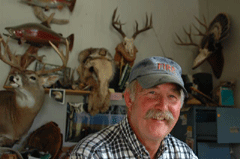
Roy Jacobs is a taxidermist in the small town of Choteau on the Rocky Mountain Front. He is for stopping gas and oil leasing in the area, but won't say who he'll vote for in the senate race.(Photo: Guy Hand Productions)
JACOBS: Probably right now I'm swinging a little bit more to the Democratic side. I think they're way more responsible. I think they're the true conservatives. They're the Teddy Roosevelt conservatives right now, I think the Democrats are.
HAND: A recent Rasmussens Reports poll says that 16 percent of GOP voters are poised to desert Burns for Tester. Roy Jacobs isn't ready to say whether he's one of them.
JACOBS: So, Senator Burns has done some good things for conservation.
HAND: Are you going to vote for him?
JACOBS: I just as soon not answer that question (laugh).
HAND: Of course, it's impossible to say how big a role the environment will play in the upcoming elections. Montanans also have sons and daughters in Iraq, worry about paychecks, hospital bills, and education. But they say they've got a special connection to this land. When asked why, their response is often a shrug and a silent nod to the open horizon, as if to say the answer is obvious.
On Montana's Rocky Mountain Front, I'm Guy Hand for Living On Earth
HAND: So who are you going to vote for? I forgot your answer.
JACOBS: I still don’t know. (laughs) Undecided at the time. I’m undecided until I go to the booth. I can’t even answer that myself.
Links
Living on Earth wants to hear from you!
Living on Earth
62 Calef Highway, Suite 212
Lee, NH 03861
Telephone: 617-287-4121
E-mail: comments@loe.org
Newsletter [Click here]
Donate to Living on Earth!
Living on Earth is an independent media program and relies entirely on contributions from listeners and institutions supporting public service. Please donate now to preserve an independent environmental voice.
NewsletterLiving on Earth offers a weekly delivery of the show's rundown to your mailbox. Sign up for our newsletter today!
 Sailors For The Sea: Be the change you want to sea.
Sailors For The Sea: Be the change you want to sea.
 The Grantham Foundation for the Protection of the Environment: Committed to protecting and improving the health of the global environment.
The Grantham Foundation for the Protection of the Environment: Committed to protecting and improving the health of the global environment.
 Contribute to Living on Earth and receive, as our gift to you, an archival print of one of Mark Seth Lender's extraordinary wildlife photographs. Follow the link to see Mark's current collection of photographs.
Contribute to Living on Earth and receive, as our gift to you, an archival print of one of Mark Seth Lender's extraordinary wildlife photographs. Follow the link to see Mark's current collection of photographs.
 Buy a signed copy of Mark Seth Lender's book Smeagull the Seagull & support Living on Earth
Buy a signed copy of Mark Seth Lender's book Smeagull the Seagull & support Living on Earth

